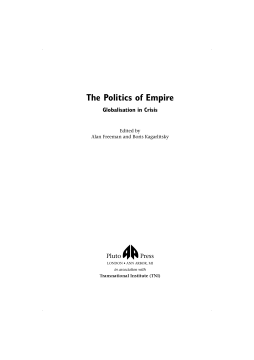
Additional Information
Book Details
Abstract
Bringing together nine leading writers and activists from around the world, this book explores the origins of a new age of Empire.
Writers including Walden Bello, Jayati Ghosh, Kate Hudson, Boris Kagarlitsky and Alan Freeman offer a wealth of factual evidence showing that globalisation has driven apart peoples, classes and nations, shaping and reshaping key regions of the world. Challenging the idea that it is inevitable, they argue that its economic contradictions have thrown the world order that sustained it into crisis.
Globalisation's opponents are shaping a new intellectual tradition. For the first time, the book brings together the critiques thrown up by resistance to globalisation, to war, and to imperialism. Free from ideology and dogma, showing how the peace and anti-globalisation movements can join forces and face the coming period of world history.
'Strongly recommended for those wishing to understand the damage that is being wreaked in the name of promoting global prosperity and democracy'
Achin Vanaik
'One of neo-liberalism's greatest crimes is to downgrade history, and the history of ideas. This book digs deep into history and, in a timely way, celebrates an intellectual but practical approach to the social, economic and environmental threats posed by globalisation'
Ann Pettifor, Senior Associate, New Economics Foundation and Editor, Real World Economic Outlook
Table of Contents
| Section Title | Page | Action | Price |
|---|---|---|---|
| Contents | iii | ||
| Introduction: World Empire - or a World of Empires? | 1 | ||
| The world after 9/ 11 | 2 | ||
| The globalisation of divergence | 8 | ||
| Origins of the age of war | 10 | ||
| Enter the new imperialism | 17 | ||
| Exit globalisation, pursued by an eagle | 28 | ||
| Another world is indispensable | 34 | ||
| 2 The Inequality of Nations | 46 | ||
| Absolute divergence | 46 | ||
| Absolute stagnation | 49 | ||
| Divergence, stagnation and the end of globalisation | 50 | ||
| The new age of competitive regionalism | 54 | ||
| The limits of statistics | 58 | ||
| The use and misuse of averages | 58 | ||
| What does money buy? Purchasing power, paying power, and growth | 62 | ||
| The statistical signifi cance of China | 70 | ||
| The new regionalism and the political geography of divergence | 73 | ||
| 3 The Crisis of the Globalist Project and the New Economics of George W. Bush | 84 | ||
| The crisis of the globalist project | 84 | ||
| Three moments of the crisis of globalisation | 85 | ||
| The new economics of George W. Bush | 88 | ||
| The economics and politics of overextension | 92 | ||
| 4 Imperialist Globalisation and the Political Economy of South Asia | 97 | ||
| Jayati Ghosh Imperialism and the global economy at the start of the twenty- fi rst century | 97 | ||
| South Asia in the era of globalisation | 105 | ||
| 5 Globalisation and the New World Order: The New Dynamics of Imperialism and War | 117 | ||
| 'Globalisation': The unfettered circulation of capital | 119 | ||
| The New World Order: The unfettered circulation of imperialist armies | 130 | ||
| The dynamics of confl ict over Eurasia | 144 | ||
| Conclusion: Globalism and the NWO as inherently crisis- prone processes | 150 | ||
| 6 The Crisis of Global Capitalism: How it Looks from Latin America | 154 | ||
| Crisis and the restructuring of world capitalism | 154 | ||
| Latin America faces the global crisis | 159 | ||
| Conclusions: Whither the empire of global capital? | 177 | ||
| 7 Facing Global Apartheid | 189 | ||
| A new political economy and geopolitics of imperialism? | 190 | ||
| African anti- capitalisms | 196 | ||
| The limits of elite opinion | 203 | ||
| Breaking the chains of global financial apartheid | 205 | ||
| Who is for and against global apartheid? | 209 | ||
| Should movements take the state, or localise? | 212 | ||
| Next steps: Towards a 'fifth international'? | 216 | ||
| Appendix: Five ideological reactions to 'global apartheid' | 221 | ||
| 8 Unity, Diversity and International Co-operation: The US War Drive and the Anti-war Movement | 231 | ||
| 9 From Global Crisis to Neo-imperialism: The Case for a Radical Alternative | 241 | ||
| Global mobility of capital | 241 | ||
| High profits and after | 244 | ||
| Back to the oil | 246 | ||
| Euro- ambitions | 248 | ||
| Europe and the new imperialism | 251 | ||
| Global competition | 257 | ||
| The struggle for Russia | 262 | ||
| Is new reformism an answer? | 266 | ||
| The programme of transition | 268 | ||
| Notes on Contributors | 275 | ||
| Index | 277 |
